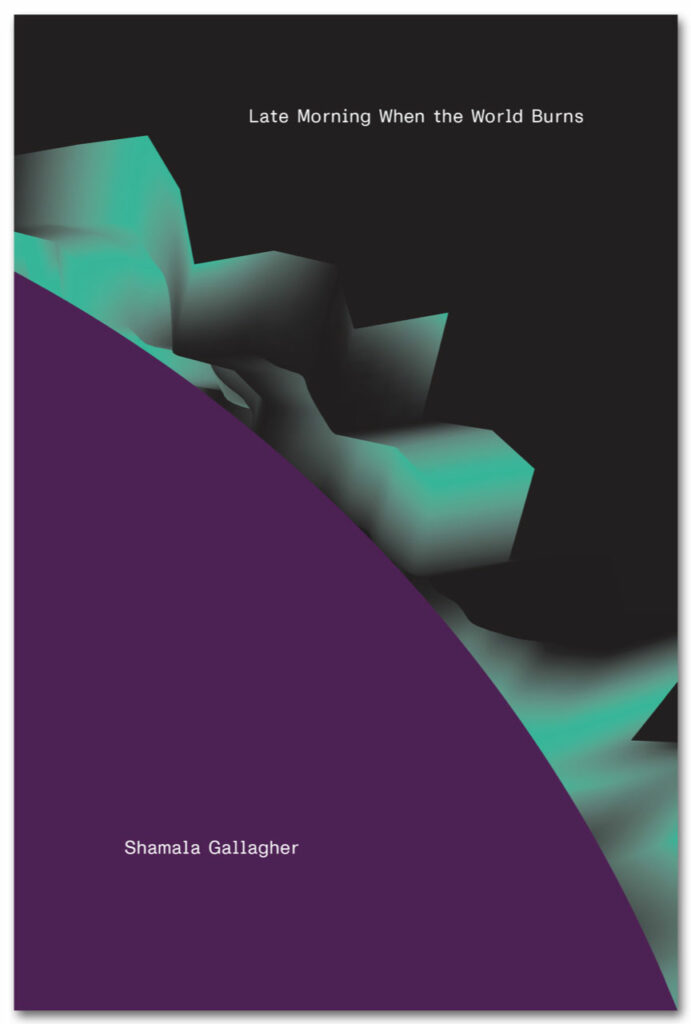Julia Cohen’s and Abby Hagler’s Original Obsessions
Late Morning When the World Burns by Shamala Gallagher
Original Obsessions seeks to discover the origins of writerly curiosity — the gestation and development of these imaginings — focusing on early fixations that burrowed into an author’s psyche and that reappear in their current book. In this installment, Tarpaulin Sky interviews Shamala Gallagher, author of Late Morning When the World Burns.
Julia Cohen’s and Abby Hagler’s Original Obsessions
Late Morning When the World Burns by Shamala Gallagher
Original Obsessions seeks to discover the origins of writerly curiosity — the gestation and development of these imaginings — focusing on early fixations that burrowed into an author’s psyche and that reappear in their current book. In this installment, Tarpaulin Sky interviews Shamala Gallagher, author of Late Morning When the World Burns.
Shamala Gallagher’s Late Morning When the World Burns (The Culture Society, 2019) offers a futuristic landscape where capitalism still churns, selling products to the speaker with signs like, “Have a cold drink before the world ends.” We enter a macrocosm where the American West has already gone permanently dry and the South is green but keeps getting hotter. People protest, teenagers play basketball, adults run for office, and, always, there are fires burning what we can’t afford to lose. Within this context, Gallagher leads the reader through a microcosm of hot yards, porch conversations, flickering party scenes, solitary nights, and even a car accident. We meet a narrator attempting to find her way toward more compassionate communication with herself and with her new neighborhood. We see the daily process of learning to care for self and others inside the politics of place, which has its own history that is and is not her own. Gallagher writes, “I know how the air feels / on both sides of desire / and on neither can you / place your palms on the table, / say done.” This collection asks us to place our hands on the table and search for a word that is wholly undone.
“running off into the spring night”
mother, I walked to the bluest
lake / seeking it / mother / I wantedthe untrembling blue / that meant
I was good / wanting is sometimes/ a small hole that opens in the
wall of the heart / that is howmy grandmother died / in Mumbai
/ which the Indians call Bombay/ if you grow up with the colonizer’s
/ words on the tongue they becomehome / sometimes / wanting
is an open blossom / at thewall of the heart / the
anonymous kind I pluckedfrom the schoolyard / where we pretended
the woods were home
***
TS: The title of your book, Late Morning When the World Burns, implies a certain time of day: the coming-into-consciousness, the body waking and engaging its environment again, stepping onto a porch. Yet, many of these poems unfold in darkness. In fact, the second line of your first poem is “Eating raisins at night.” Or we might say, these poems ask us to question why we differentiate so distinctly between night and day, and what’s happening to a nocturnal mind that connects the two through sleeplessness (or sleepiness) like your line “late morning, the night.” What was your relationship to the dark or darkness as a child?
SG: As a child, I knew the dark was large and strange, and anything could belong there. The categories that held us in broke down: at night we were all part of one another, regardless of whether we wanted to be. This scared me, and I kept a book tucked into the space between my mattress and bedframe so that it could protect me. However: books were the balm, but also the wound. At nighttime everything was equally real. I still have this trouble: when I approach nighttime I have particular difficulty understanding that novels and TV are fictional. The deaths and heartbreaks inside them become almost too much to bear.
As a child I was haunted, for example, by the book Charlie and the Chocolate Factory, supposedly appropriate for kids; someone had even shown the Willy Wonka & the Chocolate Factory movie in school. I identified profoundly with the greedy and addicted kids: Augustus Gloop, Veruca Salt, Violet Beauregard, Mike Teavee. Even now when I type their names I feel like it’s a litany of the names of the lost. Young, I felt immensely their longing for candy. I could feel their desire hum through me, and I agonized over the fact that it was never clear what happened to them. At night they were alive and dead at once, and they were me.
TS: I’ve never thought about how double-edged a book can be. In your poems, I see the dark recurring as a space of transformation, so I love that you now mention its effect on your physical self, as well as your imagination, as a kid. For me, throughout childhood, I drew the boundary with the dark itself. I didn’t imagine monsters. I just didn’t like how it felt to be alive in the dark and dreaded going to bed at night. Fear of the dark was being afraid of what would happen without vigilance, which made me an insomniac. A lot of nights, my mom would find me sitting watching TV, reading, climbing under her bed, or just kind of walking around. The dark felt like a whole other space to navigate, although it was harder to understand what I was seeing or touching or even hearing — so maybe it felt like the dark dulled my senses. How would you describe the necessity of this transformation, or blurring of boundaries, that happens in the dark? Or what kind of awakenings were you most interested in exploring as you wrote in Late Morning?
SG: Your question made me realize that it’s only as an adult that I can love the dark. I think this is because what threatened me about the dark as a child–the dissolution of self into a larger, undifferentiated whole–is actually now my primary political longing. It’s a longing to be released from the boundaries of individuality so that I can know what we call “the other.” Late Morning When the World Burns lives in that desire: the speaker looks out the windows of her house wanting to know her neighbors, wanting not to have to live separated from them by race and class. In the dark of the book, she finds communion with them, even if it’s an impossible one.
TS: Alongside the desire for connections with neighbors, I pick up on a strong need to grapple with the expansive impact of capitalism on climate change, our products and byproducts’ impact on shared environments. How this cannot be extricated from the impulse to commune with and care for neighbors. As the speaker observes, “Ice loosening // at the earth’s tip is green / heat here.” And in this collection, “here” is the south. In a poem titled “tear down the architecture, tear it / tear it & down with the stubborn columns” I picture the columns of plantations and mansions build with the profits of slavery that fueled early capitalism in America.
The speaker complicates this urge to raze, to activate change, by the second stanza, “I live in the south which is / not mine to tear down….” As readers, we infer that the speaker is a newer transplant to this region and specifically, to a predominantly black, working class neighborhood. Here, the speaker continues, “I live in a half-// white body whose long arms are mine // to cast dramatically about….” One of the major risks of this book is the way it considers how to be a more active citizen without acting out classist behavior/rhetoric. How to harness the sense of urgency that climate change should elicit in us all, in a place that does not yet feel like home? Can you speak a little more to this complicated longing?
SG: Yes, you’ve described it exactly. At the core of the book is the speaker’s flailing, excessive, unwieldy desire to be able to be “at one” with the neighbors–when the speaker is highly demographically different from them. She, like me, is from California, a white-passing South Asian/white woman from an affluent family, and her neighbors are, as you point out, mostly black, working-class Southerners. Climate change disproportionately affects low-income communities and communities of color, and the speaker lives in a low-income community of color to which she doesn’t belong. As the world ends, then, the speaker asks herself the same things I ask in this world not as close to ending as hers: what is an ethical way to speak about people demographically different from you? Where is the line between the desire to connect and the desire to do away, irresponsibly, with one’s own subject position? When do we owe one another nearness, and when do we owe one another distance? And how does this change when we don’t have much time left?
TS: Within the context of a world that does and does not belong to her, the narrator is focused on herself as well. She is working to remain alcohol-sober; identifies as taking Lexapro, encountering both the benefits and complicated side-affects. Toward the second half of the book, she also becomes pregnant. To me, she comes across as candidly relatable- someone struggling to figure out how to make choices that have larger ethical impacts when the dailiness of mental health self-care, reliance on social media/news, pressures of job and familial responsibilities consume necessary time-space. Thinking about how she’s in this place of reaching out, it’s like she’s overcoming a fear of the dark. From her protected place in the dark, she daily reaches out to her neighbors and extends more private parts of herself to the reader. I see the act of writing as reaching out to us from a future where the desire to stay in the world may be stronger than any inclination to resign herself to the possibility that the world will soon be gone.
I like how Greta Thurnberg said recently, “Hope is something you need to deserve… If we decided today that we were going to go through with combating climate change, then we definitely could do that. But only if we choose to and if we take the measures required.” As the dark promise of climate change amplifies in our 2019, as a writer, what do you hope a book can do (what potential can it hold)?
SG: Every poet I know fears that a book of poetry might do… nothing. I think the answer to your question actually might lie in this very fear. A book of poetry is made of longing to change the world–and terror that we might not be able to. But when we are in terror, we are awake. The deep trouble that attends climate change is one of affect: large portions of the world, especially the affluent sectors of the developed world, live in functional numbness. Poetry, though, can change affect: can slip inside it and transform it entirely. I think, in fact, that’s what poetry is best at doing. A book, then, is an offering of fear as hope.

